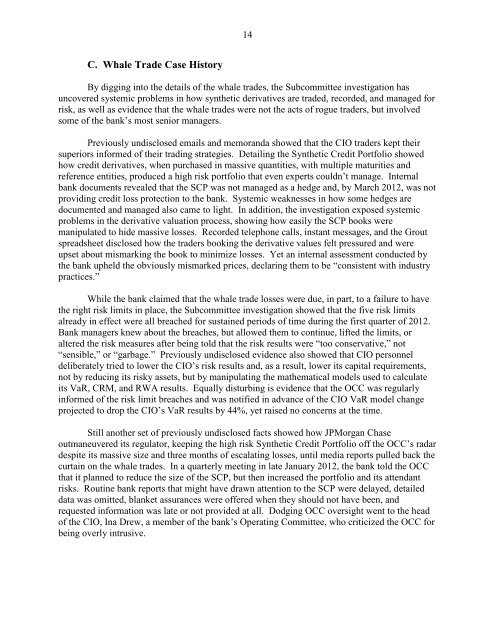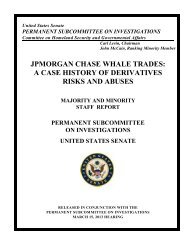- Page 1 and 2: United States Senate PERMANENT SUBC
- Page 3 and 4: JPMORGAN CHASE WHALE TRADES: A CASE
- Page 5 and 6: (a) Background ....................
- Page 7 and 8: JPMORGAN CHASE WHALE TRADES: A CASE
- Page 9 and 10: materials and reports on the whale
- Page 11 and 12: (2) Hiding Losses 5 In its first fo
- Page 13 and 14: 7 The ability of CIO personnel to h
- Page 15 and 16: 9 incorrect information, and at oth
- Page 17 and 18: 11 “fully aware” of its activit
- Page 19: 13 activities to continue, includin
- Page 23 and 24: 17 specified level; and requiring d
- Page 25 and 26: 19 principal bank subsidiaries are
- Page 27 and 28: to assuming that post in February 2
- Page 29 and 30: consisted of stressed or distressed
- Page 31 and 32: 25 commuted to his job in London. 8
- Page 33 and 34: 27 banks’ deposits, the OCC is th
- Page 35 and 36: 29 holding down interest rates, the
- Page 37 and 38: 31 combine them into a single dolla
- Page 39 and 40: 33 index known as the “XO” inde
- Page 41 and 42: III. INCREASING RISK 35 In 2005, JP
- Page 43 and 44: 37 derivatives was unusual for a CI
- Page 45 and 46: 39 provide information to the agenc
- Page 47 and 48: Source: Replication of Subcommittee
- Page 49 and 50: 43 costly if they do occur. 234 JPM
- Page 51 and 52: 45 the SCP was expected to gain $1
- Page 53 and 54: 47 bank in those scenarios. 275 Tha
- Page 55 and 56: 49 would not function as a hedge at
- Page 57 and 58: earish. 308 According to Mr. Macris
- Page 59 and 60: 53 Subcommittee for more complete R
- Page 61 and 62: 55 until after the OCC began examin
- Page 63 and 64: 57 (5) SCP Trader Compensation SCP
- Page 65 and 66: The compensation data for both Mr.
- Page 67 and 68: the CIO to protect its $350 billion
- Page 69 and 70: 63 that CIO would exit the syntheti
- Page 71 and 72:
2012, Mr. Iksil reported internally
- Page 73 and 74:
67 Martin-Artajo, Mr. Macris did no
- Page 75 and 76:
69 20.5 Bln but the current model u
- Page 77 and 78:
71 Of the four scenarios laid out i
- Page 79 and 80:
73 during a market rally so, accord
- Page 81 and 82:
75 Buy protection on the tightening
- Page 83 and 84:
77 asked the OCC about those losses
- Page 85 and 86:
79 derivatives and incurring even m
- Page 87 and 88:
81 Drew he wanted to wait until the
- Page 89 and 90:
83 2012, Mr. Iksil warned his super
- Page 91 and 92:
poor the SCP recordkeeping was, but
- Page 93 and 94:
87 The order to stop trading preven
- Page 95 and 96:
Source: See 07/16/2012 FDIC present
- Page 97 and 98:
positions in newly issued credit in
- Page 99 and 100:
93 In another context, Mr. Dimon wa
- Page 101 and 102:
95 order to be substantiated. In ad
- Page 103 and 104:
97 agitation over underreporting SC
- Page 105 and 106:
A. Background 99 (1) Valuing Deriva
- Page 107 and 108:
which it holds a concentrated block
- Page 109 and 110:
103 market making groups in the Inv
- Page 111 and 112:
105 provide his judgment and estima
- Page 113 and 114:
107 of the last 16 business days --
- Page 115 and 116:
109 The SCP had never before experi
- Page 117 and 118:
111 Evidence indicates that the CIO
- Page 119 and 120:
113 showed that the unreported loss
- Page 121 and 122:
115 that the bank’s internal inve
- Page 123 and 124:
117 daily loss of $43 million and a
- Page 125 and 126:
119 On the same call, Mr. Martin-Ar
- Page 127 and 128:
121 Mr. Martin-Artajo: “No, no, n
- Page 129 and 130:
123 showing the losses, Ms. Drew to
- Page 131 and 132:
125 trades using the Investment Ban
- Page 133 and 134:
127 Mr. Macris: “… Javier has,
- Page 135 and 136:
129 Mr. Pinto: “Ok. And you think
- Page 137 and 138:
131 to the portfolio’s enormous s
- Page 139 and 140:
133 “In terms of the worse case s
- Page 141 and 142:
135 point in the year. The cumulati
- Page 143 and 144:
137 Subcommittee that the CIO did n
- Page 145 and 146:
139 Chief Investment Office Collate
- Page 147 and 148:
sources, and inadequate procedures
- Page 149 and 150:
143 CDX.NA.IG 0-3% S09 10Y 60.750 6
- Page 151 and 152:
145 million before adjustment to th
- Page 153 and 154:
147 “The Firm believes that its v
- Page 155 and 156:
149 That the bank’s Controller fo
- Page 157 and 158:
E. Admitting the Mismarking 151 Som
- Page 159 and 160:
153 The bank told the Subcommittee
- Page 161 and 162:
155 In the case of the bank’s CRM
- Page 163 and 164:
157 The bank’s reliance on Ms. Dr
- Page 165 and 166:
159 For both the bank and its busin
- Page 167 and 168:
161 breaches, bank documents indica
- Page 169 and 170:
163 “[Mr. Zubrow] bears significa
- Page 171 and 172:
usiness. 922 165 As a result, bank
- Page 173 and 174:
167 period of time to a certain deg
- Page 175 and 176:
169 management team in London. 941
- Page 177 and 178:
171 Assets (RWA) results for the CI
- Page 179 and 180:
173 Portfolio “maintained its ups
- Page 181 and 182:
175 On January 16, 2012, the CIO’
- Page 183 and 184:
177 The Subcommittee could identify
- Page 185 and 186:
chief market risk officer in London
- Page 187 and 188:
181 In addition, the Subcommittee w
- Page 189 and 190:
Value-at-Risk 183 Value-at-Risk for
- Page 191 and 192:
185 At the end of 2011, the SCP con
- Page 193 and 194:
187 The newest VaR model “resulte
- Page 195 and 196:
189 As discussed earlier and as out
- Page 197 and 198:
191 Irvin Goldman, and Peter Weilan
- Page 199 and 200:
“Hoping that the model is somehow
- Page 201 and 202:
Mr. Bangia: Um hum. 195 Mr. Hagan:
- Page 203 and 204:
197 allowed to categorize them in o
- Page 205 and 206:
199 derivatives have to be marked-t
- Page 207 and 208:
201 The email included a chart, exc
- Page 209 and 210:
203 According to the JPMorgan Chase
- Page 211 and 212:
205 of several months, exceeding th
- Page 213 and 214:
207 CIO Mark-to-Market CSW10% Breac
- Page 215 and 216:
209 In early December 2011 these st
- Page 217 and 218:
211 advisories, or simply not doing
- Page 219 and 220:
213 have in the IB [Investment Bank
- Page 221 and 222:
management. 1195 215 While each of
- Page 223 and 224:
217 Beginning in January and contin
- Page 225 and 226:
219 experts. 1201 During the period
- Page 227 and 228:
221 (1) 2006-2009: Minimizing OCC O
- Page 229 and 230:
223 CIO management needed to “doc
- Page 231 and 232:
225 risk personnel criticized the O
- Page 233 and 234:
227 bank reportedly spent $1 billio
- Page 235 and 236:
229 understanding: “We were infor
- Page 237 and 238:
231 basic reports on a timely basis
- Page 239 and 240:
233 report provided the OCC with we
- Page 241 and 242:
235 apparent in contemporaneous ban
- Page 243 and 244:
237 (1) Providing OCC with Limited
- Page 245 and 246:
239 Subcommittee that the bank’s
- Page 247 and 248:
241 breaching its risk limits. In a
- Page 249 and 250:
243 that the CIO may have been over
- Page 251 and 252:
245 On May 9, 2012, the OCC held a
- Page 253 and 254:
247 losses, litigation etc).” 140
- Page 255 and 256:
249 Secondly, the OCC examination t
- Page 257 and 258:
F. Analysis 251 The whale trades pr
- Page 259 and 260:
y the bank were incomplete, contain
- Page 261 and 262:
255 When asked in a May 10 call wit
- Page 263 and 264:
257 of the Volcker Rule, quoting le
- Page 265 and 266:
259 reporting. All of those positio
- Page 267 and 268:
261 that bank executives were evalu
- Page 269 and 270:
(1) Rule 10b-5 263 Materiality. Dis
- Page 271 and 272:
265 (2) Section 17(a) of the Securi
- Page 273 and 274:
267 At the same time, as described
- Page 275 and 276:
269 (2) Mischaracterizing SCP as
- Page 277 and 278:
Synthetic Credit Portfolio was in
- Page 279 and 280:
273 had increased in size since Jan
- Page 281 and 282:
275 respond to regulators’ questi
- Page 283 and 284:
277 Scenario Analysis Showed SCP Wa
- Page 285 and 286:
279 Source: 2/2012 “CIO February
- Page 287 and 288:
281 Source: 4/11/2012 email from Jo
- Page 289 and 290:
283 During his interview, the Subco
- Page 291 and 292:
285 “The synthetic credit book, a
- Page 293 and 294:
mitigating hedging activities,” m
- Page 295 and 296:
289 (6) Omitting VaR Model Change A
- Page 297 and 298:
291 recast the CIO’s VaR-95 total
- Page 299 and 300:
293 and accompanying earnings call
- Page 301 and 302:
295 Source: 2/2012 presentation sli
- Page 303 and 304:
297 The May 10 10-Q reported that a
- Page 305 and 306:
299 was not, included in the bank
- Page 307:
301 When the SCP’s massive trades



